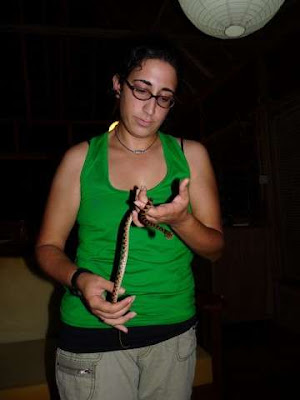 |
| Beterverwagting, Guyana: The view out Hare's window during training |
By Kristen Hare, Guyana 2000-2002
I was in the Peace Corps.
It's almost too easy, starting conversations or getting to know people by telling them this. It always comes out, though, because it begins to explain me, at least a little.
Sometimes, I think it says, "I'm brave," especially when people sigh and say, "Oh, I always wish I'd done that."
And while I can usually wrap my two years up in a few funny stories about frogs in my shoes and the rat that ate my underwear, or the work I did, or the Guyanese man I met and married, the story I don't tell is about my first night, my first real night, in Guyana.
I landed in Guyana in June of 2000, crackling with excitement about this new adventure. The air outside the plane felt hot and heavy. Inside the airport, customs agents waited in ramshackle wooden booths, and once into the Peace Corps vans, I watched the spread of wild green life outside the window.
The Peace Corps took my group to a nice hotel on the sea wall, and for a few days, I tried new foods and listened to musical accents and began admiring myself for taking on this new challenge.
Then, I was driven down red dirt roads, past skinny cows and houses on stilts, past smelly trenches and rambling rum shops, and dropped off. In front of me was the home of my host family for the next 10 weeks of training. The power went out that night, and the shock of being alone with them, so far from people and food and places I knew, had me choking on tears all through our candlelit dinner.
Later, as the power came back on, I tried to be polite and watch TV with the four women who made up my host family. But I couldn't. I could barely speak.
That night, I crawled under a pink mosquito net into my single bed and began writing.
"I am now alone and scared and so so full of tears. Dogs are barking everywhere, people talking, a long mosquito net covers my bed. All of the romance, the excitement, the thrill of this, all of it is now gone and replaced with fear and the realization that this is not a vacation. This is two years."
That weekend passed quietly. I knew there were other volunteers in my village, but I didn't know where. I think I never left the house.
On Monday, I found them and we started exercising together every morning on those red dirt roads. Each day, I sweated through my clothes, took cold bucket baths, then sweated through my clothes again. Training began, and soon, the streets of my village became familiar. People stared less and waved more. Allison, my host mother, and Ameara, her young daughter, taught me card games, let me eat cereal for dinner and loved listening to stories about snow.
I was settling in, but I still wasn't brave.
After a week, I wrote again: "I woke up in the middle of the night to some cheesy American pop music and it made me realize just how far away I am from everything and, even harder, just how long I'll be this far away."
A few days later: "Today, it all sort of hit me hard. I do not want to be here, but I am. I do not wish I'd left all of the comfort I had, but I did."
For most of those 10 weeks, I fell asleep around 7 or 8 at night. It seemed easier to sleep. It made the days pass faster. And eventually, they did, and it was the end of August, the end of training, time to swear in and move out into a new village and begin teaching.
By the end of training, something new had settled into me. It still wasn't bravery, though. "Two years from now, maybe sooner, I'll be gone from here," I wrote. "Two months have gone by like a flash and like Chinese water torture. I lay in bed this morning fighting awareness, and I thought, I'll never have experiences like this again."
Despite my choking fear, I never wanted to sigh and regret that I hadn't joined the Peace Corps.
Two days after landing in country, two days before my first real night in Guyana, I wrote a Georgia O'Keeffe quote in my journal:
"I've been absolutely terrified every moment of my life and I've never let it keep me from doing a single thing I wanted to do."
Eleven years after coming home, I'm so glad I didn't.
I had amazing adventures in the Peace Corps that included frogs hiding in my shoes, rats eating my underwear and falling in love when I very much didn't expect it.
I had amazing adventures in the Peace Corps that included frogs hiding in my shoes, rats eating my underwear and falling in love when I very much didn't expect it.
And, I discovered, I am not brave.
But that hasn't stopped me yet.













